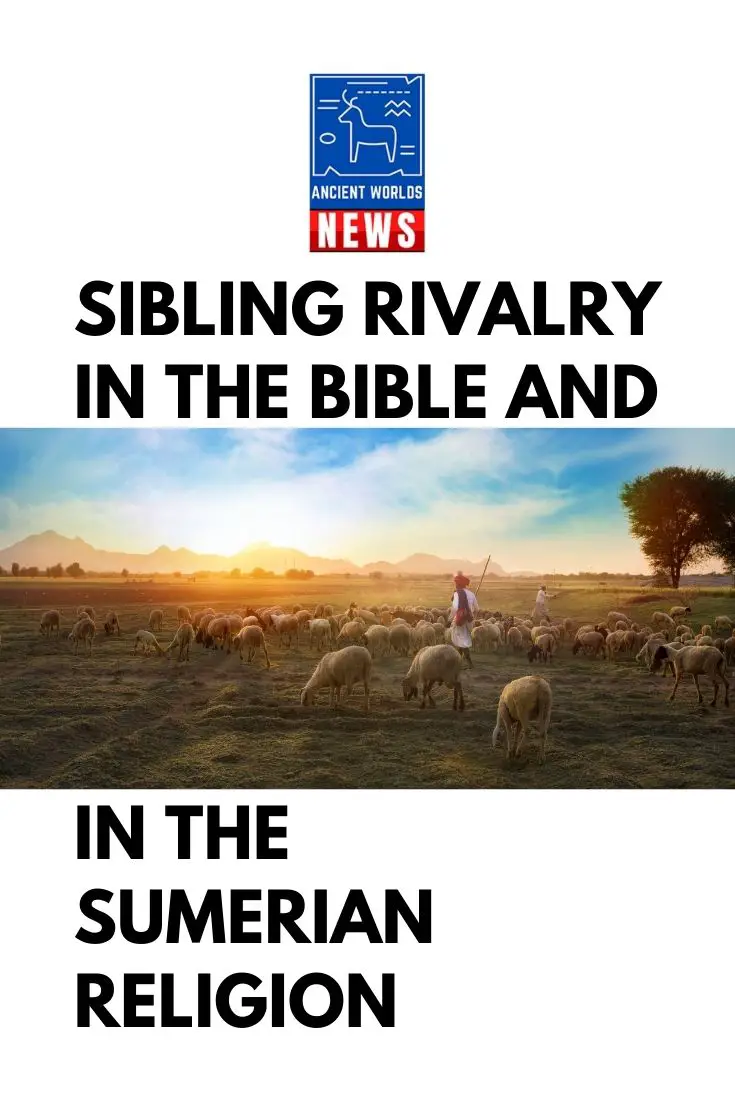Sibling rivalry is not only common in our day-today lives, but it also existed in the Bible and in the Sumerian religion. The story of Cain and Abel in the Bible and that of Emesh and Enten in the Sumerian religion are two such examples. Surprisingly, these two stories have a lot in common, and the brothers behave in almost the same way. One brother is not happy about the other’s success, creating a situation that breeds envy. They try taking the matter into their own hands, and everyone ends up losing.

Rivalry in the Bible
The story of Cain and Abel is found in the Bible, specifically in the Old Testament. The two were brothers, and their parents were Adam and Eve, the first people to be created. Cain was the firstborn. He was a farmer while Abel was a herdsman. Over time, both made offerings to God.
Cain brought farm produce, and Abel brought animals from his flock. Abel offered the fattest animals, but Cain only offered leftovers. God, therefore, was pleased with Abel’s offering, less so with what Cain offered. Cain then became angry and jealous of his brother. God noticed that Cain was angry, and so he told Cain that he would accept his offering if Cain did the right thing.
God also told Cain that he would be punished for his sins if he failed to do right. Cain was also informed that, even though he had experienced the temptation to sin, he had the power to overcome it. Sadly, Cain did not do the right thing. He tricked Abel when they were alone on the field together and hit his brother, killing him. After that, the Lord asked Cain about his brother’s whereabouts.
Cain rudely answered that he was not his brother’s keeper. God at once knew that Cain had taken his brother’s life. The Lord got very angry, and he told Cain that Abel’s blood was crying to him from the ground. He also said that Cain was now cursed.
The Lord told him that all of Cain’s labor would be in vain; he would not bear any produce. He was also destined to wander the earth. Cain pleaded with God; the punishment was more than he could bear.
Cain felt that being driven from the land, hidden from God’s presence, and wandering restlessly, vulnerable to strangers, was too much punishment. However, God reaffirmed that Cain deserved to suffer vengeance seven times over for what he had put Abel through.
The Lord decided to mark Cain to protect him from being killed by any who would run into him. Cain then set off to the land of Nod and away from God’s presence. Later, Adam and Eve were blessed with another son; they named him Seth. Adam felt that Seth was a replacement son that God had given him after Abel.
Rivalry in the Sumerian Religion
Enlil, the god of air, wanted the land to yield grain and trees in abundance, so he created two brothers, Enten and Emesh. Each were given specific duties; Enten was a farmer, while Emesh was a shepherd. The two brothers had a fight because Emesh wanted to take over Enten’s position. They took their case to Enlil, and he ruled in favor of Enten. The two brothers reconciled, rejoiced, and became friends again.
Similarities
Both stories involve brothers and a rivalry. In the Bible, the rivalry is between Cain and Abel, while in the Sumerian religion, it is between Enten and Emesh.
In both cases, envy is the dominant emotion. In the Bible, Cain is envious of Abel since God was pleased with Abel’s offering more than he was with Cain’s. In the Sumerian religion, Emesh is envious of Enten, and he wants to take over his position.
In both cases, one brother is more hardworking and kinder than the other. Abel, in the Bible, was more hardworking than Cain and was much more generous as well. Similarly, in the Sumerian religion, Enten was more hardworking and kinder than Emesh.
In each case, the supreme beings learned about the rivalry. In the Bible, God asked Cain about his brother’s whereabouts, and when Cain responded that he was not his brother’s keeper, God knew Cain had killed Abel. God also knew that Abel was dead because Abel’s blood was crying to him from the ground. In the Sumerian religion, Enlil learned about the rivalry between Enten and Emesh, but in this case, the brothers presented themselves before Enlil.
In both religions, the supreme beings rule in favor of the more honorable brothers, and the selfish ones do not get their way. In the Bible, God mourned Abel and cursed Cain, even throwing him out of his presence. In the Sumerian religion, Emesh was the selfish one who wanted to take Enten’s position; naturally, Enlil realizes that Emesh is the less honorable brother and therefore rules in favor of Enten.
In each story, the gods do not tolerate evil, but they are also forgiving. In the story of Cain and Abel, after Cain pleaded with God regarding his punishment, God showed mercy and marked Cain to protect him during his wandering. Similarly, in the Sumerian religion, Enlil is fair, and even though he rules in favor of Enten, he rules in such a way that the two brothers remain friends.
In these two stories, the less honorable brothers realize their mistakes after their punishments were meted out. After Enlil ruled in favor of Enten, Emesh realized that he was wrong, and he rejoiced and reconciled with his brother. Similarly, when God found out that Cain had killed Abel and laid out Cain’s punishment, Cain realized the seriousness of his mistake and pleaded for forgiveness.
Summary
In each situation, the conflict is between male siblings; one brother is innocent and kind-hearted, and the other brother is mean and envious and wants what doesn’t belong to them. Furthermore, in both stories, once the gods are made aware of the rivalry, they are not pleased, and they end up ruling in favor of the more honorable brothers. However, the supreme beings are merciful in both the Bible and in the Sumerian religion because the two less honorable brothers do eventually realize their mistakes.

